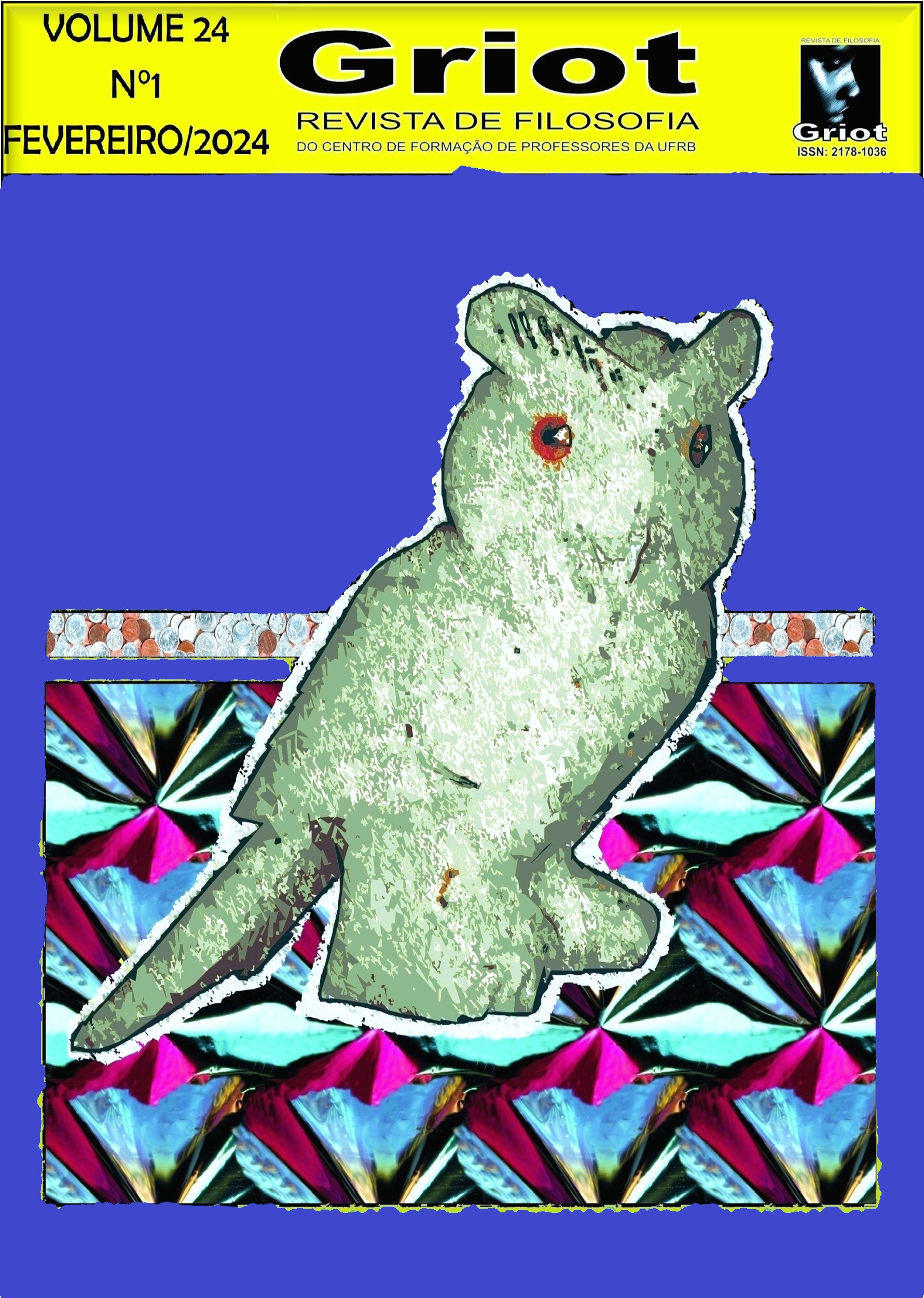For a self-suppression of the method: genealogy as a genealogical program and the dimension of power in Nietzsche
DOI:
https://doi.org/10.31977/grirfi.v24i1.3569Keywords:
Genealogy; Self-suppression; Style; Discontinuity; Power.Abstract
Our objective will be to argue in favor of the idea that in Nietzsche there is no genealogical method, stricto sensu, with universalist and systemic-substantivist epistemic claims (traditionally conceived by justificationist and foundationalist philosophies from Plato to Hegel). However, there is a characteristic genealogical program, which opposes the majority genealogies and philosophies insofar as a self-suppression of the method is imposed as the primary and heterodox register of its reflection. We start from the hypothesis that Nietzsche’s genealogy, understood programmatically, became viable because it was markedly structured on the basis of three reflexive movements that free his genealogical thinking from an analytical-methodological conduct, like the canon, which are: (i) variation of style in his writing; (ii) critical historicism or radical and (iii) discontinuity of origin. However, it would be pointless to show how clearly the Nietzschean genealogical program was outlined if we couldn’t say where it came from, for whom and for what purpose, or even more so, what it is intended to denounce. Therefore, in our conclusion, we will show, with some reservation, how the Nietzschean genealogical program lends itself to evaluating the dimension of power.
Downloads
References
AZEREDO, V. A metodologia de Foucault no trato dos textos nietzschianos. Cadernos Nietzsche. vol. 1 n. 35, São Paulo, p. 57-85, 2014.
BEVIR, Mark. What is Genealogy?. Journal of the Philosophy of History. 2 (2008) 263–275.
BLONDEL, E. As aspas de Nietzsche: filologia e genealogia. In: Marton, S. Nietzsche hoje? Colóquio de Cerisy. São Paulo: Editora brasiliense, p. 110-140, 1985.
BLONDEL, E. The questions of Genealogy. In: Schacht, R. Nietzsche, Genealogy, Morality. Berkeley/Los Angeles/ London: University California Press, 1994.
BRUSOTTI, M. Descrição comparativa versus Fundamentação: o quinto capítulo de Para Além de Bem e Mal: Contribuição à história natural da moral. Cadernos Nietzsche. vol. 37 no. 1 São Paulo Jan./June 2016.
CONWAY, D. Genealogy and Critical Method. In: Schacht, R. Nietzsche, Genealogy, Morality. Berkeley/Los Angeles/ London: University California Press, 1994.
HOY, D. Nietzsche, Hume and the genealogical method. In: Schacht, R. Nietzsche, Genealogy, Morality. Berkeley/Los Angeles/ London: University California Press, 1994.
DALLA VECCHIA, R. Genealogia: O chão próprio de Nietzsche. In: Dalla Vecchia, Ricardo Bazilio; Araldi Clademir; Viesenteiner, Jorge. (Org.). Nietzsche. 1ed. São Paulo: Editora Phi, 2019, v. 1, p. 241–251.
FOUCAULT, M. Nietzsche, a genealogia e a história. In: FOUCAULT, Michel. Microfísica do poder. Tradução: Roberto Machado. 10ª ed. Rio de Janeiro: Graal, 1992.
FOUCAULT, M. Ditos e escritos II: Michel Foucault, Arqueologia das Ciências e História dos Sistemas de Pensamento. Trad. Elisa Monteiro. Rio de Janeiro: Forense Universitária, 2000.
GADAMER, H-G. Verdade e método I. Trad. Flávio Paulo Meurer. 10.ed. Petrópolis –Rio de janeiro: Editora Vozes, 2015.
GEUSS, R. Nietzsche and Genealogy. European Journal of Philosophy. 2. 1994.
GIACOIA, O. Autossupressão como catástrofe da consciência moral. Estudos Nietzsche, Curitiba, v. 1, n. 1, p. 73–128, jan./jun, 2010.
HEIDEGGER, M. Nietzsche II. Trad. Marco Antonio Casanova. Rio de Janeiro: Forense Universitária, 2007.
LÖWITH, K. De Hegel a Nietzsche. São Paulo: Editora Unesp, 2013.
MACHADO, R. Introdução: por uma genealogia do poder. In: FOUCAULT, M. Microfísica do poder. Rio de Janeiro: Edições Graal, 1998.
MACINTYRE, A. Genealogy and Subversions. In: Schacht, R. Nietzsche, Genealogy, Morality. Berkeley/Los Angeles/ London: University California Press, 1994.
MÜLLER-LAUTER, W. Os problemas do Antagonismo na Filosofia da História de Nietzsche. In: MÜLLER-LAUTER, W. Nietzsche: sua filosofia dos antagonismos e os antagonismos de sua filosofia. São Paulo: Editora Unifesp, 1971.
NIETZSCHE, F. Além do bem e do mal: prelúdio a uma filosofia do futuro. Trad. Paulo César de Souza. 2ª ed. São Paulo: Companhia das Letras, 1992.
NIETZSCHE, F. Aurora: reflexões sobre os preconceitos morais. Trad. Paulo César de Souza. São Paulo: Companhia das Letras, 2004.
NIETZSCHE, F. Ecce homo: como cheguei a ser o que sou. Trad. Paulo César de Souza. São Paulo: Companhia das Letras, 2005.
NIETZSCHE, F. Genealogia da moral: uma polêmica. Trad. Paulo César de Souza. 4ª ed. São Paulo: Companhia das Letras, 1998.
NIETZSCHE, F. Humano demasiado humano: um livro para espíritos livres. Trad. Paulo César de Souza. São Paulo: Companhia das Letras, 2000.
PASCHOAL, A. E. Genealogia, crítica e valores: uma co-relação entre fins e meios. Sofia, [S. l.], v. 3, n. 2, p. 127–141, 2014.
SAAR, M. Understanding Genealogy: History, Power, and the Self. Journal of the Philosophy of History, 2, 2008, p. 295–314.
SAAR, M. Genealogy and Subjectivity. European Journal of Philosophy. 10(2): 231–245, 2002.
SOMMER, A. On the genealogy of the genealogical method: Overbeck, Nietzsche, and the search for origins. Bulletin of the Institute of Classical Studies, vol. 46, Issue Supplement 79, 2003, p. 87–103.
SOUSA, P. A constituição hermenêutica filosófica das ciências humanas Hans-Georg Gadamer. Griot: Revista de filosofia, Amargosa: Bahia, v. 20, n. 2, p. 224–243, junho, 2020.
STEGMEIER, W. As linhas fundamentais do pensamento de Nietzsche. Petrópolis: Vozes, 2013.
ZITTEL, C. Selbstaufhebungsfiguren bei Nietzsche. Würzburg: Königshausen und Neumann. 1995.
Downloads
Published
How to Cite
Issue
Section
License
Copyright (c) 2024 Fernando da Silva Machado

This work is licensed under a Creative Commons Attribution 4.0 International License.
The authors who publish in Griot: Revista de Filosofia maintain the copyright and grant the magazine the right of first publication, with the work simultaneously licensed under the Creative Commons Attribution 4.0 International License, allowing sharing and adaptation, even for commercial purposes, with due recognition of authorship and initial publication in this journal. Read more...









































































